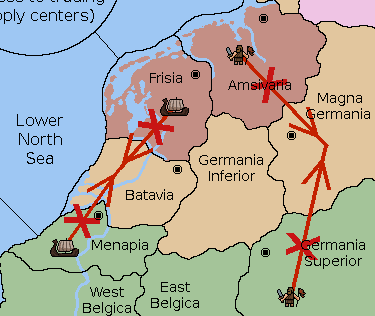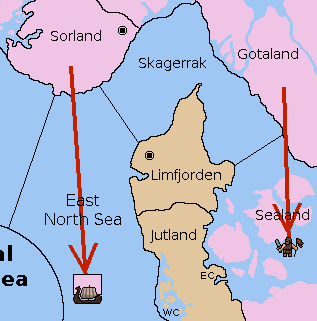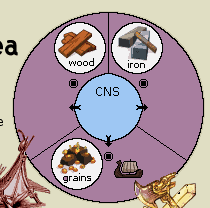I recently played a Diplomacy variant called "North Sea Wars". The map is small. Four players start with two home centers each and there are 15 centers total. The map has a strategic depth which is not obvious from the start.
The Frysians and the Romans are basically playing a double Prisoner's Dilemma (plus talking) right from the start. They can both go for the centers Batavia and Magna Germania, which means they will bounce each other out unless they cooperate. Of course, the most profitable strategy for both is make the other cooperate while defecting.

This dilemma is (kind of) resolved by the Norse player. The Norse have an obvious expansion way to the south. So unless Frysia and Rome cooperate, Norse will conquer Frysia first and can then overpower the Romans. Meanwhile the Britons might stay neutral and slowly take the Central centers.
The Frysians are in a two-front war and they will lose (somewhat like Austria in classic Diplomacy). Their only argument is that the Romans need them to survive against the Norse horde. This is not a very strong argument, so Frysia usually dies.
The Romans should (initially) cooperate with Frysia and use them as a shield against Norse. In the third or fourth year, Rome can either stab Frysia for more land war or go for the sea against Briton.
The Norse have an obvious start to Sealand, which brings them next to a Frysian home center and a neutral center. The fleet can bounce Briton in Alba and deny them a first year build (why?) or go to Skagerak for a 99% chance on the neutral Limfjorden center or sail south against Frysia. The last option has the most flexibility and should be the first choice. The best start is a cooperation with Rome and a fair split of Frysia. Together with Limfjorden this should give you the most military power. If you can then conquer the Romans, you win solo. However, keep an eye on Briton and do not let them get the central centers too easily.

As a Briton you have no land contact to the other players. Since none of the other players has a very strong urge to sail near you, you can probably stay neutral at first. However, at some point you must interfere so build up a nice fleet and strike swiftly when the time comes.
The central centers are special. You can take them, but you cannot leave them. They are not that important to win. However, if a player can get two units in there he is immortal. A mutual support-hold makes it impossible to conquer. An ideal situation is one unit in the center ring and one fleet in Central North Sea. The central fleet can still support (and convoy) the seas and leave if necessary, but if it gets attacked it retreats into the ring and immortality ensues.

As long as no player takes interest in the center, it is not important. Once one player enters it however, the other players have a good incentive to not let him take three centers uncontested. According to the strategies above, Briton is usually the one who enters Central first. Preventing him to dominate it is one of core negotiation arguments among the three other players.
Overall, a nice little map. Make sure every players knows the long-term implications noted above, otherwise the predictable outcome is: Frysia dies first, then Rome, the Norse wins unless Briton is the better tactician.